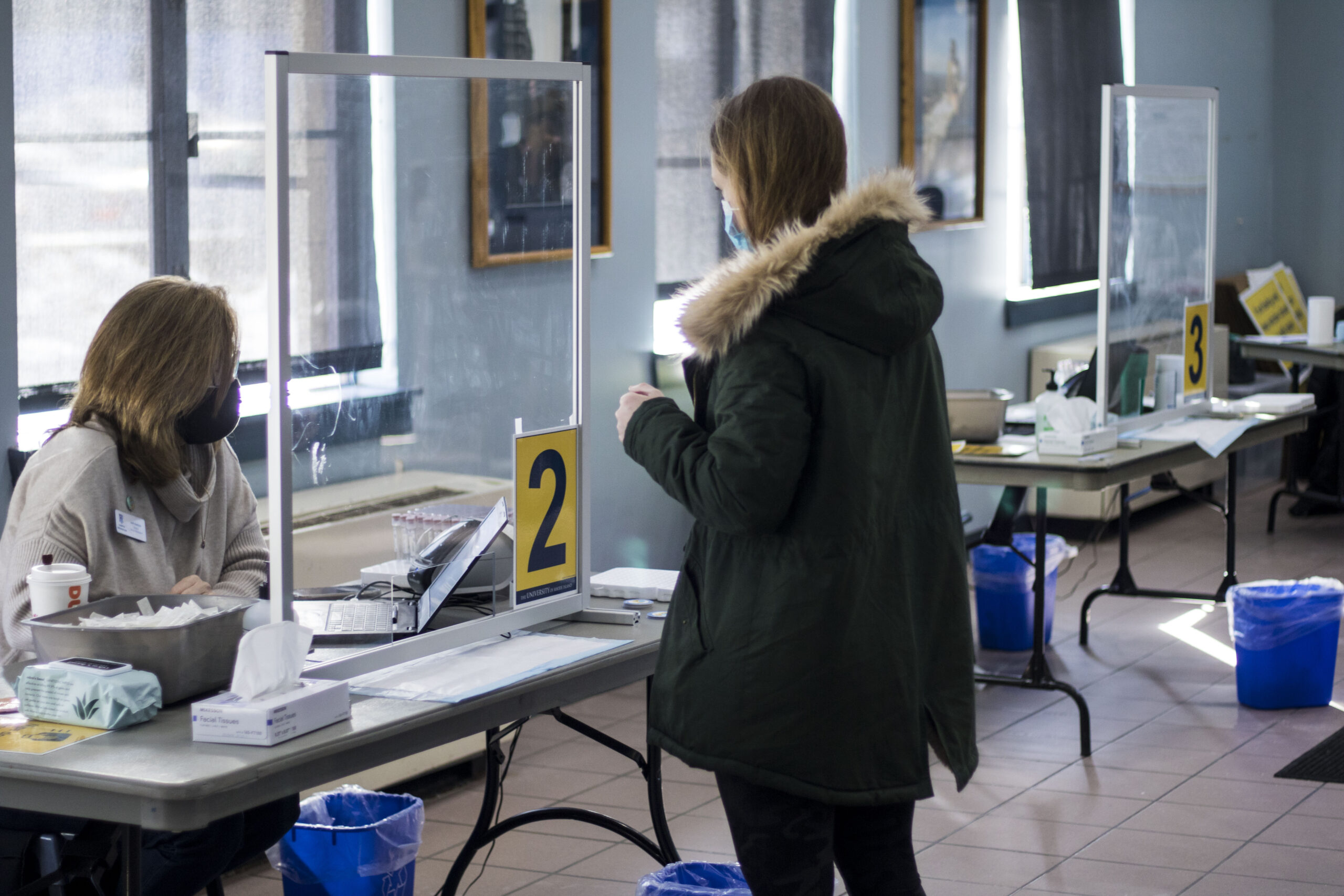URI is requiring students to be vaccinated, but if they’re exempt, they must receive twice-weekly testing. Photo credit: Greg Clark.
The University of Rhode Island recently updated its COVID-19 policies for the fall 2021 semester, due to the rise of the delta variant and the increase in fully vaccinated students.
Last year, the University’s guidelines included mask mandates, modified on-campus living arrangements and decreased in-person activities to keep students and faculty safe.
Now, the University has adjusted its COVID-19 protocols to follow guidance from the Center for Disease Control and Prevention (CDC) and the Rhode Island Department of Health (RIDOH).
Dave Lavallee, the public information officer for URI’s COVID-19 task force, said the biggest change from last year is the requirement of vaccines.
“Students coming back in the fall have to provide proof that they’re fully vaccinated, or that they have gotten a proven exemption from the University,” Lavallee said.
According to Dr. Christopher Nasin, URI Health Services’ medical director, requiring all students to get vaccinated will ensure the most normal experience possible this semester. He emphasized the general importance of the vaccine, to the rise of the delta variant, but also for larger, overarching COVID-related concerns.
Additionally, the University announced on Sept. 2 that vaccines will be required for faculty as well. Staff must now show proof of vaccination or have an approved medical or religious exemption by Oct. 15.
“We’re just trying to ensure the health of our community,” Nasin said. “We’re trying to make it safe for our students and faculty, and we’re hoping to get on to a more normal way of doing business. That’s how you do it; through vaccination.”
There are approximately 1,000 students exempt from the vaccination requirement, citing either religious or medical reasons. For these students who are exempt, the University has implemented twice-weekly surveillance testing. Nasin said this testing has been put in place to stop the spread of the virus among the most vulnerable populations.
All students will have access to COVID-19 testing at any time in the Memorial Union, regardless of vaccination status, according to Nasin. Students who exhibit symptoms of COVID-19 or who have been in contact with someone who has tested positive for COVID-19 will have access to testing in Health Services.
Both Lavallee and Nasin said that around 90 percent of the University’s students will be vaccinated at the beginning of the Fall semester. Both said they feel confident that this will ensure the safety of the community.
“My goal was for 85 percent or more, and we’re north of that, which is great,” Nasin said. “My prediction is that there will be few cases because of the vaccination, despite breakthroughs, because the majority of our population is vaccinated.”
However, knowing that high vaccination rates don’t necessarily guarantee immunity to COVID-19 or the more contagious delta variant, the University will continue to require students to wear face coverings while indoors. This includes, but isn’t limited to, classrooms and dorm buildings.
The University has planned for these breakthrough cases by setting aside on-campus quarantine spaces for vaccinated students that test positive for COVID-19.
Though, some mandates and guidelines will differ between vaccinated and unvaccinated students. For example, unvaccinated students will be required to quarantine in their permanent address if they test positive and will be subject to contact tracing.
Vaccinated students will not be required to participate in weekly surveillance testing, and will only be required to get tested if they have been in contact with someone who has tested positive, according to Lavallee.
He and Nasin agreed things will seem more “normal” than last year.
“One thing that we’re doing, that we didn’t have available last fall, is that we’re back to a full dining experience,” Lavallee said.
There will also be full participation in athletics, and the number of fans admitted will no longer be limited at games. In-person shows will also be resumed at the Ryan Center for students to attend.
The University is continuously updating these guidelines, as the coronavirus is a “moving target,” according to Nasin. Not only will the University continue to follow the guidance of the CDC and RIDOH, but they will continue to collect their own data, verify all vaccination cards and hold unvaccinated students accountable.
“We cannot say it strongly enough, the best way to have a great semester, that’s as normal as possible, is to get vaccinated,” Lavallee said. “It’s a safe, effective vaccine, and you should get vaccinated.”





